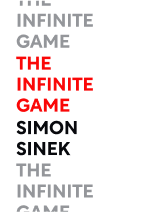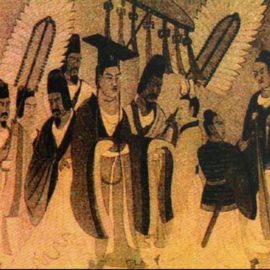

This article is an excerpt from the Shortform book guide to "The Infinite Game" by Simon Sinek. Shortform has the world's best summaries and analyses of books you should be reading.
Like this article? Sign up for a free trial here .
What is Simon Sinek’s The Infinite Game about? What is the key factor, according to its author, in sustaining long-term business success?
In The Infinite Game, Simon Sinek explores the differences between infinite and finite games. He walks you through how to develop an infinite mindset that will put you and your organization on a path for long-term success in business.
Here is a brief overview of the key concepts and ideas discussed in The Infinite Game by Simon Sinek.
Simon Sinek: Business Is the Infinite Game
In The Infinite Game, Simon Sinek applies James P. Carse’s concept of finite and infinite games to the domain of business. Sinek argues that people who view business as an infinite game are more successful. Those who aim to arrive at an ending “win” point do not end up as well-off as those who see their challenges as part of a larger game that is constantly evolving and never-ending.
Two Games: Finite and Infinite
Sinek defines finite games as those with known players, fixed rules, and an agreed-upon objective. A poker game, for example, has identifiable players, strict rules, and a pre-set ending point where one player is judged to have won and the players stop playing.
In contrast, infinite games have both known and unknown players, changeable rules, and no clear ending point at which one person is declared the winner and everyone goes home.
The biggest difference between finite and infinite games is this: When players leave a finite game, the game ends. When players leave an infinite game, the game continues on without them.
Examples of finite games include:
- Entertainment games: sports, card games, board games, and so on
- Wars
- Political elections
Examples of infinite games include:
- Friendships (no one “wins” being a friend and then stops having friendships)
- Careers (no matter how successful you are, you are never declared “winner” of your career)
- Parenting (there’s no way to “win” parenting and then stop parenting forever)
- Geopolitics (no country “wins” the world, after which all countries stop interacting with each other)
| The Inspiration for the Book Sinek started thinking about these concepts after reading James Carse’s Finite and Infinite Games, a philosophical treatise published in 1986, which contrasted the idea of a finite game (played to win) with an infinite game (played to keep playing). Carse applies these theories to many aspects of life, including parenthood, politics, sports, religion, and cultural interactions. He argued that while finite games promise wealth, status, and power, infinite games promise longevity. When it was published, Carse’s book received mediocre reviews, with some reviewers calling it unoriginal and uninspired. The book fell into obscurity until Sinek connected it to his theories on business management, bringing it back into the public consciousness. |
Business Is an Infinite Game
Sinek’s key insight on which he bases his book is that business is an infinite game:
- There are many players, some of whom you won’t even recognize as players, and many of whom enter and leave the game along the way.
- There are no fixed rules; other than being limited to legal behavior, there’s no formula or handbook for what you should do or how you should play.
- There’s no agreed-upon objective; one person’s goal will be different from another’s and neither is right or wrong. Further, there are multiple metrics for success, and they can be interpreted in various ways; for example, one realtor might claim to be everyone’s “favorite” based on customer satisfaction reviews, while another might claim to be the “favorite” because they have more regional offices.
- There’s no end. When a company goes out of business, other businesses continue, until they, too, step out of the game (at which time the game again continues on).
| Infinite Games Lay the Foundation for More Games Although Sinek brought renewed popularity to Carse’s ideas, he wasn’t the first to re-examine them. For example, in 2011, Kevin Kelly, founding executive editor of Wired Magazine and bestselling author, explored finite and infinite games as part of his book What Technology Wants. Kelly notes that finite games are dramatic (think military battles or football games) while infinite games can be boring—no one wants to read about a company that’s doing its job well or two countries at peace. However, the boring stories are the ones that lead to future stories. When people cooperate, they can create opportunities for others, whether that be new settlements where people can live and work, or new artistic collaborations that enhance the quality of peoples’ lives. In other words, people pay more attention to finite games and their dramatic storylines because they are fun and exciting. Therefore, people sometimes believe that these stories are the important ones—the stories (or games) that matter to the world. However, it’s infinite (boring) games that end up having greater consequences, spawning more games both infinite and finite. Kelly argues that technology is an infinite game because it can be the basis upon which other games are played: It can provide options and increase choices available to people as to how they will live their lives. |
Developing an Infinite Mindset
Sinek contends that someone who sees their business as part of an infinite game will make decisions based on long-term strategies that develop long-term strength, while someone who plays a finite game will aim for short-term wins that might weaken their organization in the long run. Consistently, businesses that succeed over many years are run by leaders with infinite mindsets, while businesses that fail are run by leaders with finite mindsets.
Sinek discusses several key differences in the attitudes and beliefs of finite and infinite mindsets:
- Winning versus playing: A finite-minded player plays to defeat others. In contrast, an infinite-minded leader plays to maintain a healthy position within a competitive field.
- “It’s about me” versus “It’s about us”: A finite-minded leader thinks only of herself and her own company, while an infinite-minded leader considers the impact her company will have on her employees, her community, the economy, and the outside world.
- Reactive versus proactive: Finite-minded players react to disruptions, while infinite-minded players anticipate them and proactively prepare for them.
- Short-term versus long-term goals: Finite-minded work to benefit their near-term bottom line, while infinite-minded players work toward a longer-term view of success. Ironically, infinite-minded companies often end up with higher profits even though they’re not focused as fixedly on their bottom line because their longer-term strategies pay off over time.
- Short-term threats versus long-term threats: Finite-minded leaders center their corporate strategies around responding to specific, definable threats posed by their rivals. Infinite-minded leaders focus on exploring opportunities or developing innovations that might strengthen their organizations.
- Stability versus resilience: Finite-minded companies try to weather storms. Infinite-minded companies aim not just to weather storms but to be made stronger by them. They are resilient rather than merely stable.

———End of Preview———
Like what you just read? Read the rest of the world's best book summary and analysis of Simon Sinek's "The Infinite Game" at Shortform .
Here's what you'll find in our full The Infinite Game summary :
- Why businesses who see the game as finite don't survive
- How to develop an infinite mindset that will put you and your organization on a path for long-term success
- How the purpose of business is changing






